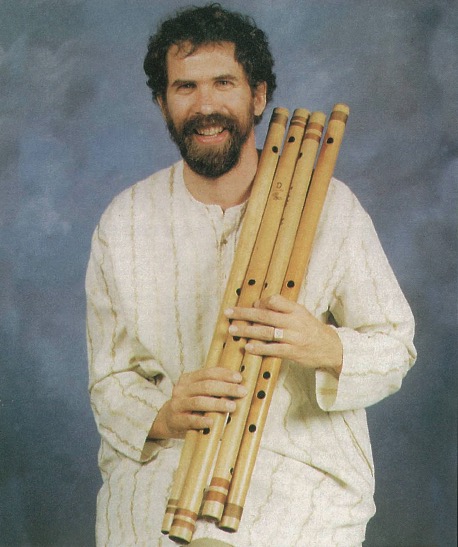Music to me is a matter of bliss. When you find that bliss, you say, ‘Ah…That’s real music.’ That is the feeling I go for.” American-born, forty-year-old flautist and composer John Wubbenhorst knows about bliss. His life has been a mystical musical odyssey, and his debut CD, Facing East (70 minutes, Facing East Productions, $15.98), epitomizes his adventures in rapture. It is by far the most successful merger of Indian and Western music and instrumentation to date. As Wubbenhorst confides, “I could name innumerable East-West explorations that were pretty lousy. I’ve heard where someone sticks a saxophone with a sitar and says it’s fusion, but it’s not really happening. It has to come from a deeper level.”
Wubbenhorst’s depth comes from two years of study with India’s maestro, Hari Prasad Chaurasia, coupled with twenty-five years of “soaking in the Vedic culture,” including ayurveda, astrology and “two hours of meditation each day.” He recalls how he fell in love with Indian music at age 13, “It really hit me on a deep level. I would listen to Ravi Shankar, and it was obvious that he was extremely relaxed and at the same time very precise–two seeming opposites. But that’s what you have to be. In fact, the two things Hari Prasad would say over and over again were, ‘Relax,’ and, ‘More precise.’ He said little else. He is such a quiet man.”
Wubbenhorst studied Western classical music with Kim Haley of New York’s Julliard School of Music and jazz composition at the Berklee College of Music in Boston and with Darius Brubeck. Meanwhile, his love and appreciation of Indian music grew, and his spiritual seeking intensified. He told Hinduism Today, “I learned Transcendental Meditation from Maharishi Mahesh Yogi when I was fourteen. I enrolled in his university in Fairfield, Iowa, when I was sixteen years old. I stayed for five years. He wasn’t there, but I must have seen thousands of hours of him on video. I was totally in love with him. There are these great people on the planet who really have expanded consciousness. These are the most precious people.” Yet through these rich years there was a yearning for something more.
“I had this idea of studying the bamboo flute when I was eighteen,” John recalls. “But I doubted for a long time. I thought, ‘I can’t find any teacher. I can never be successful.’ Finally, the idea didn’t go away, and I said, ‘I just better do this!’ I stopped doubting, and it turned out great. It just goes to show you that if you follow your bliss, everything works out. The saying, ‘Doubt is death,’ is true.” Wubbenhorst went to India not expecting to study with Hari Prasad Chaurasia, but study with him he did. As Wubbenhorst relates, “There were only four or five people he was teaching. He came every day for three hours and didn’t charge any money. Sometimes he would fly all night, get off the airplane and come directly to the lesson. He blew my mind. I’ve been around great jazz and classical musicians, but I’ve never seen such a love for teaching.”
For Wubbenhorst, spirituality and music are inseparable. He explains, “The ragas are a great spiritual sadhana for me. When I play the flute, I feel like I’m being drawn into this huge raga, and each one is a huge, beautiful ocean in and of itself. After playing for a while, you disappear. And I think the goal of a lot of yoga is that the small “I” disappears and you’re into something bigger. After all, this ego that we have is not the reality. It’s not at all what we are. In addition, the bamboo flute is so charming, so earthy and so mystical. It feels so complete and natural. It’s beyond words. The sound draws you to finer levels of consciousness, and the raga structures are deeper laws of nature. So, you are drawn into these deeper, subtler aspects of creation, and the surface levels fall away. Hari Prasad told me, ‘I think that is the reality. All this other stuff is the dream.’ ”
Wubbenhorst’s dream of Facing East came true with creative contributions from Sandip Burman on tabla, Zolton Lantos on violin and nine other talents. The unique performances, exquisite compositions and sensitive orchestration prove out his theory, “If you’re getting bliss, that’s the reward. If you feel bliss, someone else will have to feel it.”
FACING EAST PRODUCTIONS, POST OFFICE BOX 3302, SILVER SPRING, MARYLAND 20918 USA. TEL: 800-431-2763 (USA); 301-215-5049; WWW.I-A-P.COM/FACINGEAST


